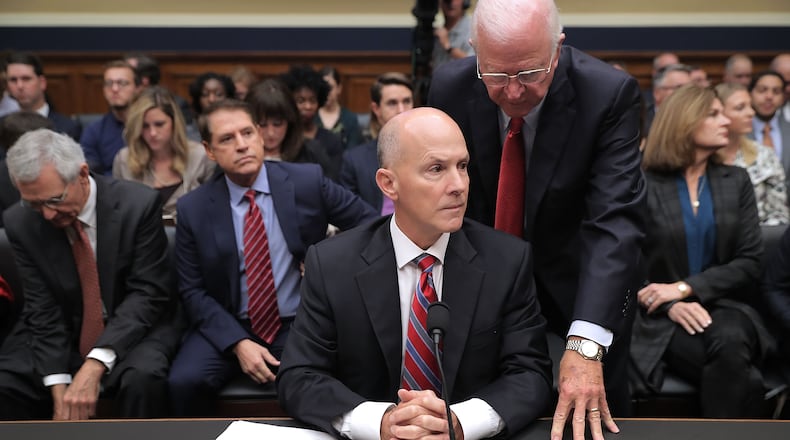The Atlanta credit bureau Equifax ramped up its spending over the last three months to lobby the federal government and protect its image as it took fire for exposing the personal records of more than 145 million Americans.
Its two main competitors, meanwhile, shifted their resources in order to do the same.
New federal records released this week show Equifax increased its budget to lobby Congress and agency regulators by 12 percent between the second and the third quarters of this year. Roughly three weeks before the end of the third quarter, Equifax announced its system, which hosted millions of social security numbers, birth dates and addresses, had been compromised.
It's unclear how much of the $280,000 the company spent went to repairing its image after company leadership learned of the massive hack on July 29 or the breach was made public on Sept. 7. The federal forms show only that overall spending increased by $30,000 from the prior quarter.
But the document includes notable details about what Equifax's lobbyists were focused on between July and the end of September. That includes a Consumer Financial Protection Bureau regulation curtailing the industry practice of forced arbitrations -binding customers to a mediation session with an arbiter and forcing them to waive their right to sue - and related legislation authored by Georgia U.S. Rep. Barry Loudermilk that would have curtailed class-action lawsuits against certain businesses.
Equifax was excoriated last month for including forced arbitration language in the terms of service of the free credit monitoring it was offering its customers after the breach. The company quickly dropped the provision amid the public outcry, while Loudermilk, R-Cassville, abandoned his legislation, which would have limited class-action payouts if companies were sued.
The firm also lobbied on legislation touching health care, immigration verification software and student loan repayment.
“Equifax works to ensure that new legislation captures the benefits of credit reporting to the U.S. economy, as well as the effects of certain regulation on the financial system,” Equifax said in a written statement to the Atlanta Journal-Constitution on Thursday. “We believe in fair industry regulation and advocating for policies that protect consumers’ rights, as well as the integrity of the consumer data industry.”
The spending uptick is notable as the company looks to rebuild the trust of Congress, federal agencies and the general public.
Former Equifax CEO Rick Smith embarked on an apology tour of sorts earlier this month. In four back-to-back appearances before congressional committees, he personally apologized for the breach and attributed it to a mix of "human error and technology failures."
Other spending
Meanwhile, Equifax competitors Experian and TransUnion acknowledged in their own federal lobbying reports that they had to do extra work to protect their industry and companies’ reputations since the hack became public.
Both companies kept their in-house lobbying funding steady between the second and third quarters this year, but each noted in their report that they took time to discuss issues such as data breaches, cyber security and credit freezes as they related to the Equifax hack.
A TransUnion spokesman said the company “engaged additional lobbyists to help us monitor and respond to legislative and regulatory reaction” to the breach. Experian did not respond to requests for comment.
Bryan Reber, a University of Georgia professor who specializes in crisis communication, said it made sense for Equifax’s two competitors to mobilize in the aftermath of the hack to protect their interests.
“They know that their industry is ripe for this sort of (criticism),” he said, “so bumping up their lobbying because they’re not under the same scrutiny as Equifax is probably less likely to cause the same kind of controversy.”
Equifax, he said, might feel pressured to keep their lobbying money in check in order to be perceived as honest and remorseful.
Separate federal filings from Equifax’s political action committee indicate the company significantly curtailed its spending supporting federal political candidates.
Equifax donated to only four U.S. House members since July, compared to the 14 candidates it supported in the second quarter. Two of those recent donations went to Georgia lawmakers — $1,000 to Savannah Republican Buddy Carter and $2,000 to Atlanta Democrat David Scott, who spoke after the hack about wanting to rebuild trust in the company. Both donations came before the breach was made public but after company leadership had discovered the compromised data.
A spokeswoman for Scott said the eight-term U.S. House member donated the money to the mentoring group Boys to Men.
One question that went unanswered in the disclosures is former Georgia U.S. Sen. Saxby Chambliss’ role with the company.
The Republican made the front page of virtually every newspaper earlier this month sitting directly behind Smith and huddling with the former executive during breaks during his committee testimony on Capitol Hill.
Chambliss has worked at the mega law firm DLA Piper since his retirement from the Senate at the end of 2014. And the firm — which itself was hacked earlier this year — was recently hired by Equifax to help out following the breach, according to the National Law Journal.
Chambliss did not file paperwork for lobbyists during the third quarter. Consultants who spend at least 20 percent of their time lobbying for a client, receive a salary and make more than one contact with federal officials regarding a client issue are legally required to file paperwork as a federal lobbyist.
Neither Chambliss nor DLA Piper returned requests for comment. Equifax did not address the AJC’s question about Chambliss in its written statement.
About the Author
Keep Reading
The Latest
Featured




